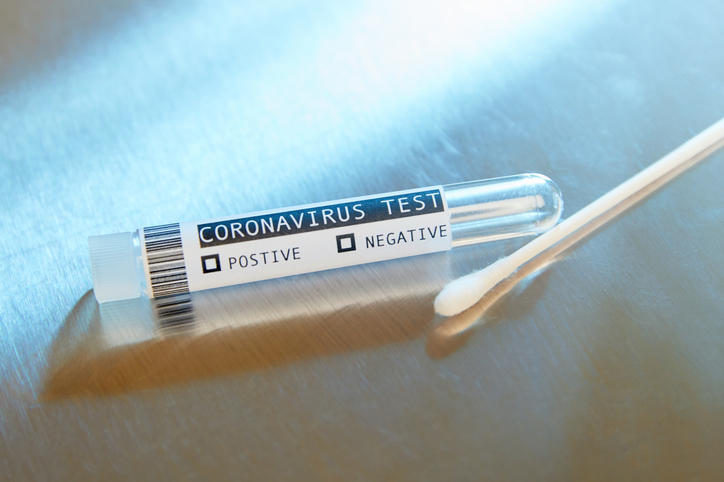
Everyone wants to avoid catching COVID-19. Maintaining good oral hygiene is an excellent place to start.
Did you know that there’s a connection between COVID-19 and your oral health? Poor oral health has been linked to a host of chronic illnesses, such as heart disease and diabetes. It shouldn’t be surprising then that the condition of your teeth and gums may play a factor in the chances of you becoming infected by the virus. Let’s do what we can to avoid that possibility!
The Connection Between Oral Health and COVID-19
Bacteria is the common thread between your oral health and COVID-19 (and other chronic illnesses). When you don’t take care of your teeth, bacteria grows. As it continues to grow, bacteria can weaken your immune system and mutate into an aggressive form that spreads to the lungs.
Now, imagine if that bacterial infection hits the body at the same time as the virus. You’re fighting off two infections simultaneously, which raises the risk of a serious illness — and possibly death. One study found 50% of patients with COVID-19 who had passed away also harbored a secondary bacterial infection.
Gum disease develops due to out-of-control bacteria, as well. When the surface of your gums are infected by bacteria, the virus can more easily attach to the gums and gain entry to your mouth and respiratory tract.
Furthermore, gum disease may elevate an inflammatory marker known as CRP. To combat the inflammation, your immune system goes into overdrive. This same phenomenon occurs when COVID-19 infects your body. So when your body tries to fight off both gum disease and the virus, your immune system may turn on itself.
It’s well known that people who suffer from chronic conditions like heart disease, diabetes, and high blood pressure have a greater chance of becoming infected with the virus. Poor oral hygiene can worsen those conditions, leading to a more severe case of COVID-19.
A recent study from Egypt noted a link between poor oral health and severe COVID-19. This was especially pronounced for those with heart disease. The study reviewed 86 Egyptian heart patients who had also tested positive for COVID-19 and found that those who displayed poor dental hygiene had more severe cases of the virus and took longer to recover.
What You Can Do to Take Care of Your Teeth — And Prevent COVID-19
In addition to getting vaccinated, good oral hygiene is one of your best defenses against COVID-19. More than that, dental care is an essential part of your overall health. The Centers for Disease Control and Prevention has excellent tips on how to maintain your oral health, but here are the basics of good oral hygiene:
Brush Your Teeth. Those twice-a-day brushings take on even more importance during the pandemic. It’s the best way — other than a professional teeth cleaning — to swipe away bacteria that cause plaque and tooth decay. Remember to brush correctly: Hold a soft-bristled brush at a 45-degree angle, and using a circular motion, brush all tooth surfaces. To prevent tooth decay, use a fluoride toothpaste, and brush for at least two minutes daily.
Floss Daily. Flossing will reach the spaces between your teeth where brushing alone cannot.
Rinse With a Mouthwash. Like floss, a mouthwash can reach those hard-to-clean places. Ask your dentist for a recommendation, but a mouthwash with chlorhexidine, an antibacterial agent, is a good choice. Although mouthwash isn’t a replacement for brushing and flossing, it’s another useful tool in promoting good oral health.
Avoid Sugary and Starchy Foods. Sweets and starchy foods like bread, pasta, and chips increase the amount of acid in the mouth. Acid is harmful for two reasons. It erodes tooth enamel and boosts decay-causing bacteria. Try eating more fiber-rich, crunchy foods, and vegetables. Sip water with your meals to wash away acid left by acidic and sugary foods.
Stop Smoking. Cigarettes weaken the immune system, which makes it harder to fight off infections. If you smoke and have a dental procedure, you may take longer to heal. Smoking also stains your teeth and causes bad breath, so it’s in your best interests to quit now.
Get Regular Dental Checkups. Don’t forget to make those twice yearly dental appointments! A thorough cleaning to remove plaque and tartar can prevent cavities. A checkup will also catch any dental problems before they progress into a more serious condition, like a dreaded root canal!
Time to Schedule Your Semi-Annual Visit
Schedule an appointment at Espire’s Colorado Springs location today! Our highly trained dentists will guide you on proper oral hygiene techniques to prevent COVID-19.
Don’t live near our Colorado Springs office? Find one of our other locations near you.
Colorado Springs
8610 Explorer Drive #315
Colorado Springs, CO 80920


